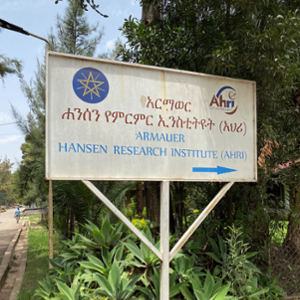Ethiopia

Institutions
Armauer Hansen Research Institute
The Armauer Hansen Research Institute (AHRI) is a multidisciplinary scientific research institution that was initially established to combat leprosy and conduct mycobacterial research in Ethiopia, and later expanded to research focused on other major infectious diseases, including TB. AHRI is located within the All Africa Leprosy Research Training and Rehabilitation Centre (ALERT) Hospital campus which cares for over 9000 people with HIV, including many co-infected with TB. The site has a TB inpatient unit, TB outpatient clinic and an MDR-TB patient care program, one of the major centers in Ethiopia.
Learn more
In-County Activities
Tuberculosis (TB) is the leading cause of death due to an infectious disease globally and a public health emergency in Ethiopia which is one of only 14 countries worldwide on all three WHO “high burden countries” lists for TB, multidrug resistant (MDR)-TB, and TB/HIV. A major barrier to improved research, treatment and control of TB in Ethiopia is the scarcity of Ethiopian scientists and health professionals with the relevant research knowledge and expertise to carry out internationally recognized research. The goals of this renewal application for the “Ethiopia-Emory TB Research Training Program (EETB-RTP)” include continuing to build human resource capacity and enhance the research infrastructure for robust TB-related research in Ethiopia; to build relevant sustainable research capacity in Ethiopia by aligning EETB-RTP research training activities with the Ethiopian MOH priorities outlined in the “National Plan for Tuberculosis Research in Ethiopia (2017- 2022)”; to build research capacity by providing mentorship, leadership, and team science training; and to enhance the diversity of Ethiopian investigators.
The central theme of the TBRU ASTRa study component in Ethiopia is to identify specific T cell signatures and their association with distinct states and outcomes of Mycobacterium tuberculosis infection and disease. The study aims to understand why some individuals categorized as having latent TB infection will progress to active TB disease, potentially identifying those at highest risk of progression and prioritizing them for preventive interventions.
It is uncertain whether diabetes affects the risk of developing latent tuberculosis infection (LTBI) following exposure to Mycobacterium tuberculosis (Mtb). We assessed the relationship of diabetes or prediabetes and LTBI among close and household contacts (HHCs) of patients with active pulmonary tuberculosis (TB) disease in Addis Ababa, Ethiopia. It was concluded that HHCs with diabetes may be more likely to have LTBI than those with euglycemia. Further investigations are needed to assess mechanisms by which diabetes may increase risk of LTBI after Mtb exposure.
Traditionally, single critical concentrations of drugs are utilized for Mycobacterium tuberculosis (Mtb) drug susceptibility testing (DST); however, the level of drug resistance can impact treatment choices and outcomes. Mutations at the katG gene, which are the major genetic mutations in multidrug resistant (MDR) Mtb, are usually associated with high level resistance. We assessed the minimum inhibitory concentrations (MICs) of MDR or rifampin resistant (RR) and isoniazid (INH) resistant Mtb isolates to determine the quantification of drug resistance among key anti-tuberculosis drugs. The study was conducted on stored Mtb isolates collected as part of a national drug resistance survey in Ethiopia. Our findings suggest a role for rifabutin treatment in a subset of RR TB patients, thus potentially preserving an important drug class. The high proportion of moderate level INH resistant among MDR Mtb isolates indicates the potential benefit of high dose isoniazid treatment in a high proportion of katG gene harboring MDR Mtb isolates.